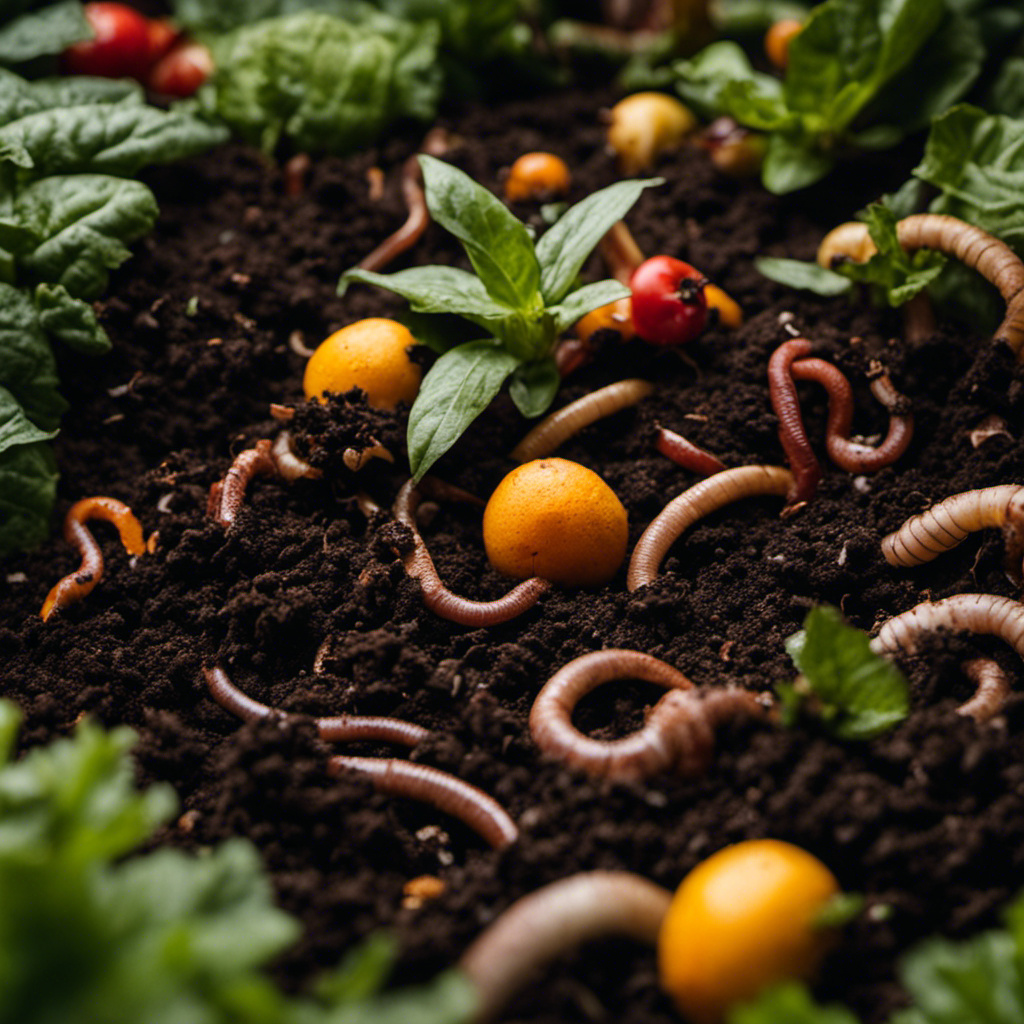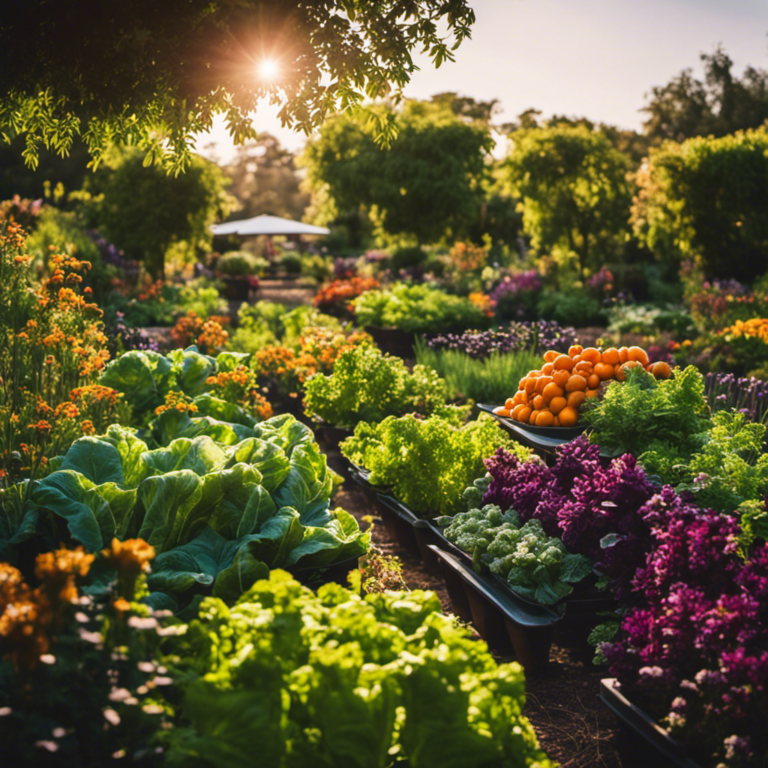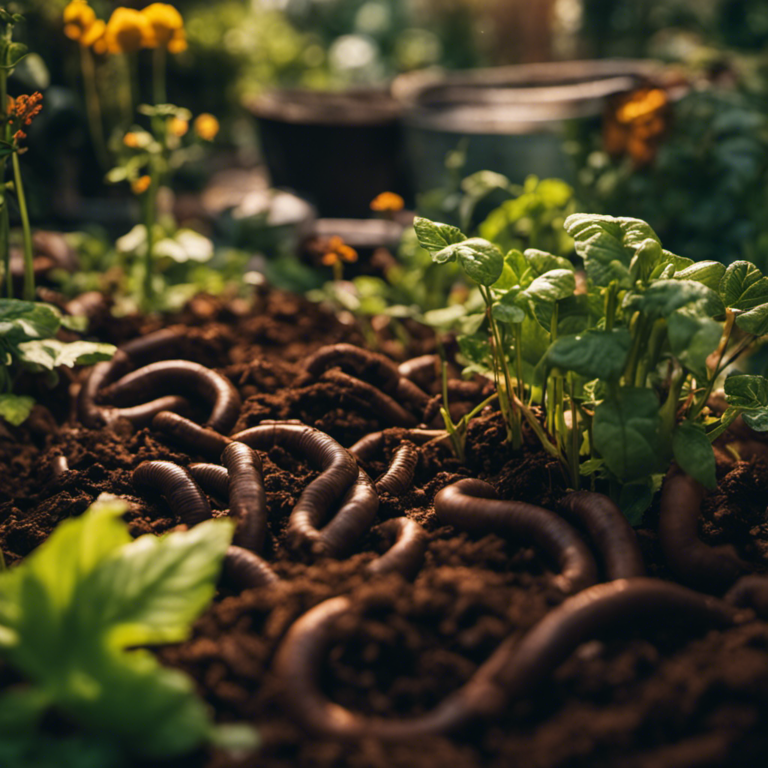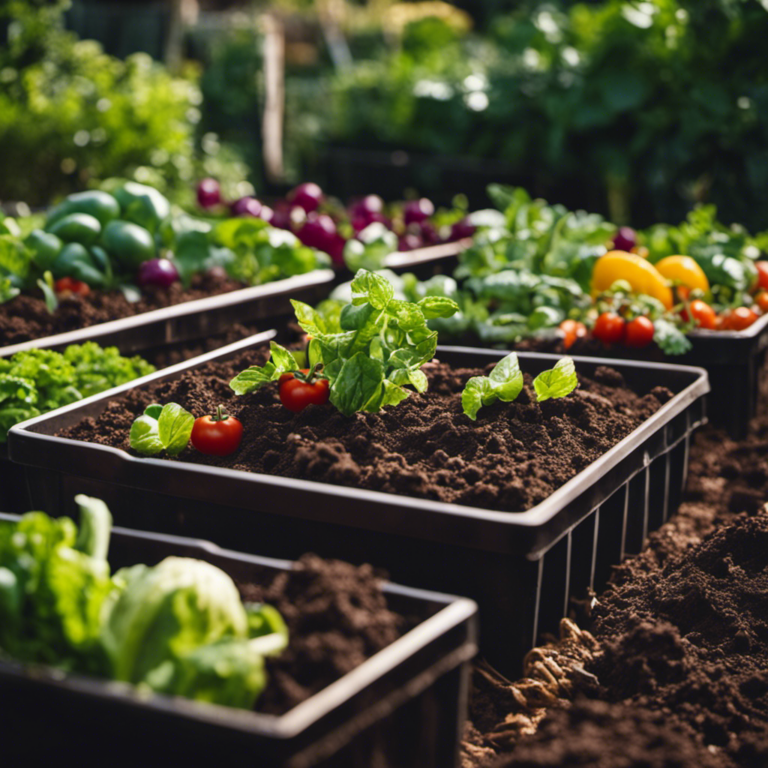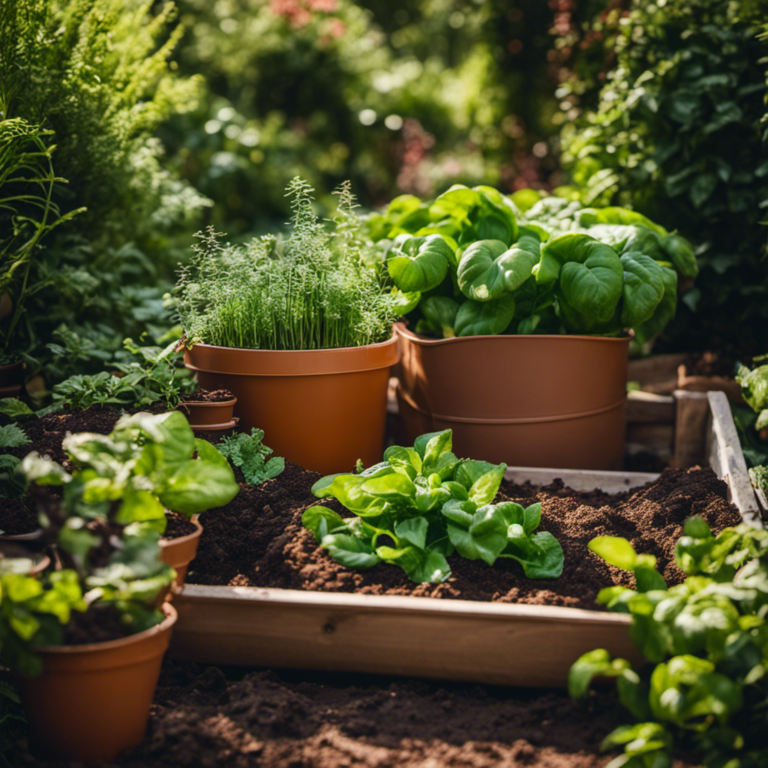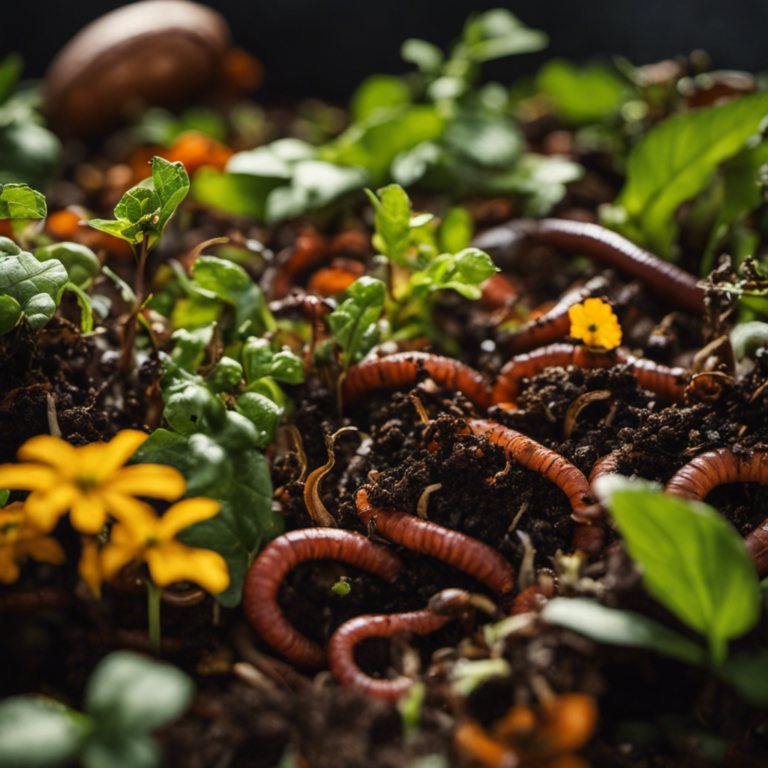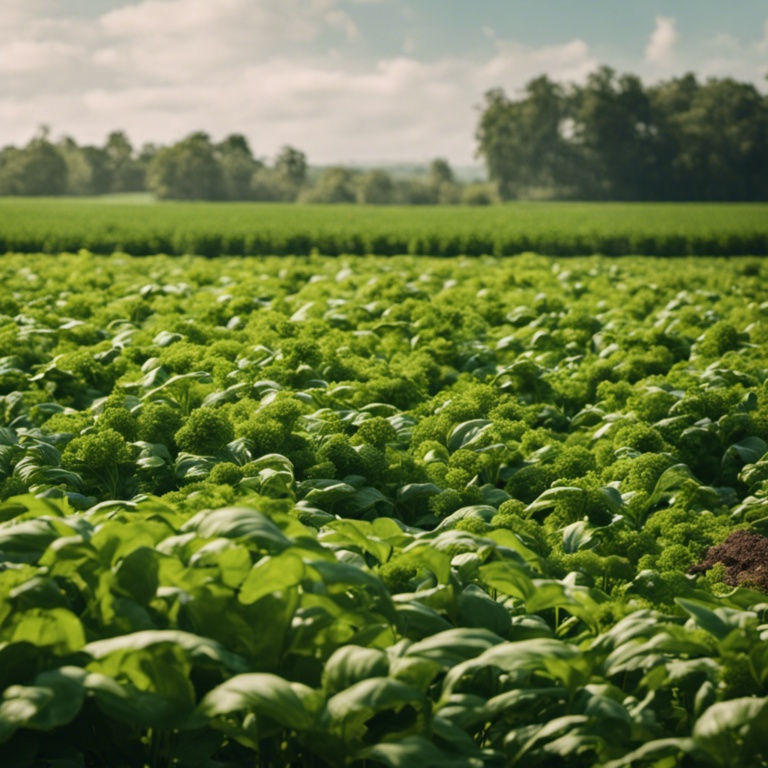As a passionate gardener, I’ve always believed in the principle of reaping what you sow. That’s why I’ve dedicated myself to finding effective techniques for organic composting.
In this article, I’ll share practical methods that can help transform your garden into a thriving oasis. We’ll explore traditional composting, the power of worms through vermicomposting, fermenting waste with bokashi, and using compost tea to enrich your soil.
By implementing these techniques, you’ll be able to nurture nutrient-rich soil and enjoy bountiful harvests. Let’s dive in and work together to support Mother Nature!
Key Takeaways
Effective Organic Composting Techniques for a Thriving Garden
Organic composting is a simple yet powerful process that transforms waste into nutrient-rich soil, providing the perfect foundation for a flourishing garden. Instead of overwhelming you with complex methods, let’s explore some straightforward techniques that will help you achieve this garden transformation.
One technique is vermicomposting, which involves harnessing the power of worms. These little creatures break down organic matter and produce nutrient-rich castings that enrich the soil. It’s a natural and efficient way to compost, giving your plants the vital nutrients they need to thrive.
Another method is bokashi composting, where waste is fermented to speed up decomposition. This anaerobic process allows you to compost a wider range of materials, including meat, dairy, and citrus peels. It’s a great option for those who want to minimize waste and maximize their composting efforts.
Additionally, hot composting can be employed to accelerate the decomposition process even further. This method requires a careful balance of carbon-rich materials like leaves and nitrogen-rich materials like food scraps. With the right mix and proper aeration, you can produce high-quality compost in a shorter period.
To supercharge your soil and optimize plant growth, consider using compost tea. This liquid gold is created by steeping compost in water, allowing the nutrients to leach into the liquid. You can then use this nutrient-rich tea to water your plants, giving them an extra boost of nourishment.
By starting your composting journey today, you’ll witness the transformation of your garden into a vibrant and healthy oasis. Remember, composting is not only beneficial for your plants but also for the environment. It reduces waste and helps create a sustainable cycle of nutrients. So grab a compost bin, gather your organic waste, and let nature work its magic in your garden.
Quote: "Composting is not just a way to enrich your soil; it’s a way to nurture the Earth and create a greener future." – [Your Name]
Traditional Composting Methods
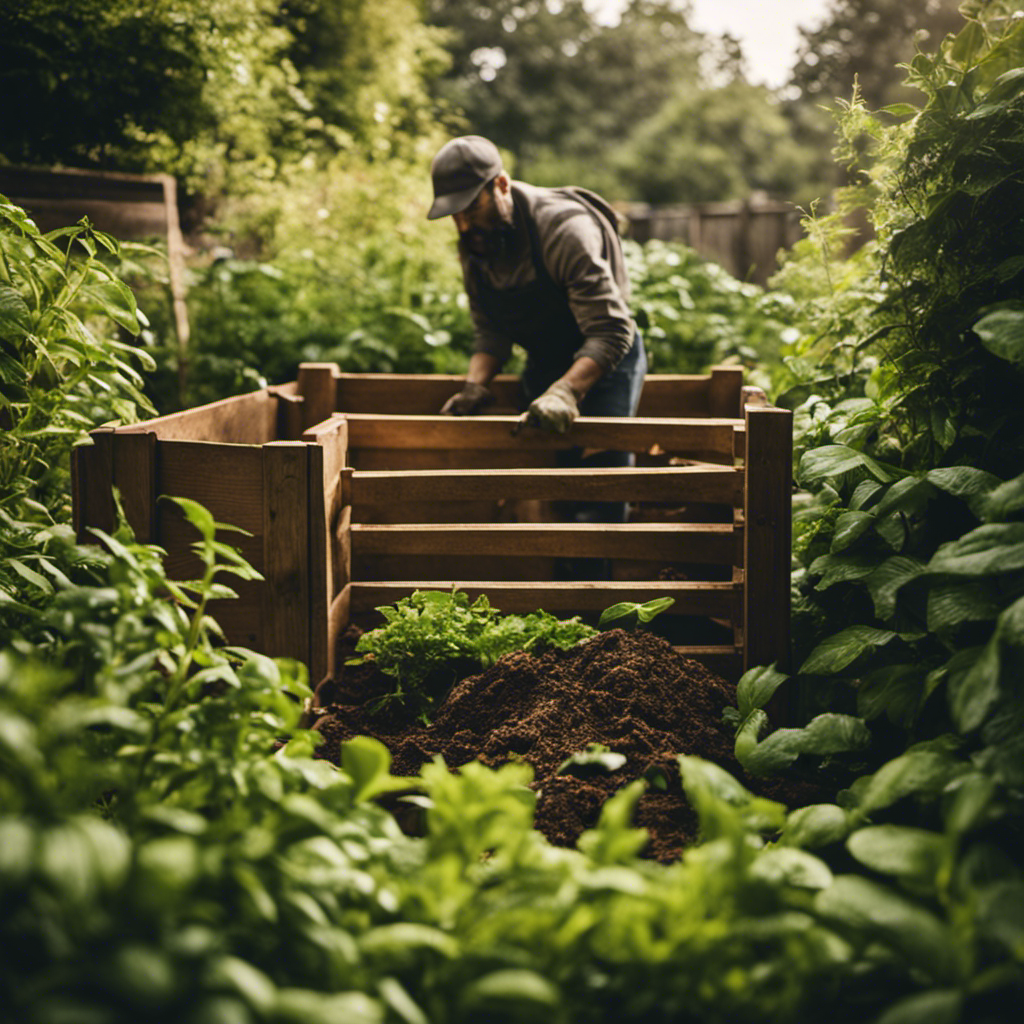
In my experience, traditional composting methods have proven to be reliable and efficient for producing nutrient-rich compost. Traditional composting involves the decomposition of organic waste materials in the presence of oxygen, making it an aerobic process. This method utilizes the natural breakdown of organic matter by microorganisms, such as bacteria and fungi, to convert it into humus, a dark, crumbly substance that enhances soil fertility.
Aerobic composting requires regularly turning or mixing the compost pile to ensure proper aeration and uniform decomposition. This allows the microorganisms to thrive and efficiently break down the organic matter. By maintaining the right balance of carbon-rich materials (like dry leaves or straw) and nitrogen-rich materials (like kitchen scraps or grass clippings), you can create an ideal environment for aerobic decomposition.
On the other hand, anaerobic composting occurs when organic waste decomposes without oxygen. While this method can be useful for certain situations, such as composting in a sealed container or composting large quantities of organic waste, it’s generally less efficient and can produce odorous byproducts.
For those who want to contribute to a healthier environment, traditional composting methods offer a practical and sustainable way to produce nutrient-rich compost. By following proper techniques and maintaining the right balance of materials, you can create compost that enriches soil, supports plant growth, and contributes to a healthier environment.
Vermicomposting: Harnessing the Power of Worms
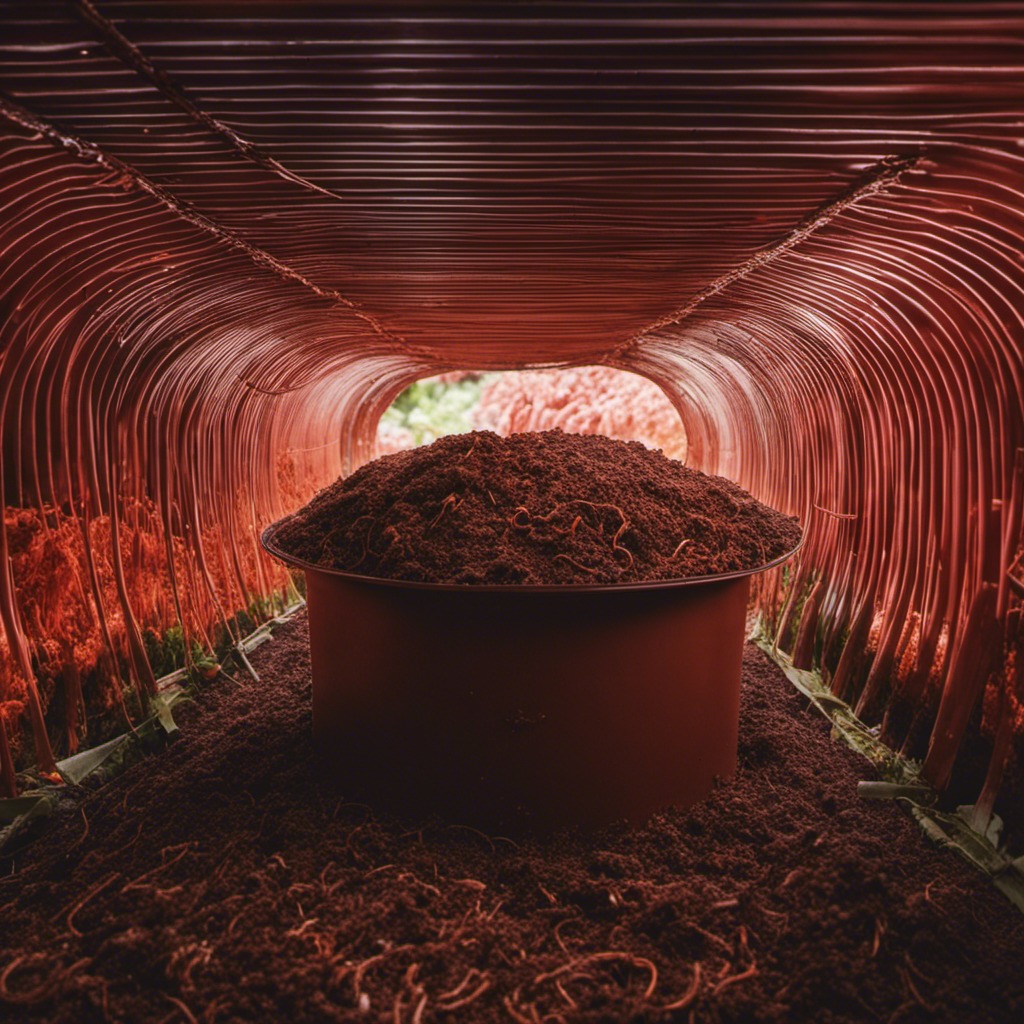
Harnessing the Power of Worms for Nutrient-Rich Compost
I utilized the power of worms to create nutrient-rich compost through a process called vermicomposting. Vermicomposting involves the use of red wigglers, a specific type of worm, to break down organic waste into valuable worm castings that provide nutrients for plants.
To better understand how vermicomposting works, envision a worm bin filled with layers of bedding material like shredded newspaper or cardboard. The worms wiggle through this cozy environment, feasting on kitchen scraps and other organic matter. As they digest the waste, they produce nutrient-rich castings that gradually accumulate at the bottom of the bin.
Here are some important points to remember for maintaining a worm bin:
-
Ensure proper moisture levels: Worms require a moist environment to thrive, so the bedding material should be damp but not overly wet.
-
Provide adequate ventilation: Good airflow is crucial to prevent the bin from becoming too damp, which can lead to unpleasant odors or the growth of harmful bacteria.
-
Feed your worms regularly: Remember to add small amounts of kitchen scraps or other organic waste to keep the worms well-fed and active.
-
Harvest the worm castings: After a few months, you can begin harvesting the valuable worm castings from the bottom of the bin to use as a nutrient-rich fertilizer for your plants.
Bokashi: Fermenting Waste for Nutrient-Rich Soil
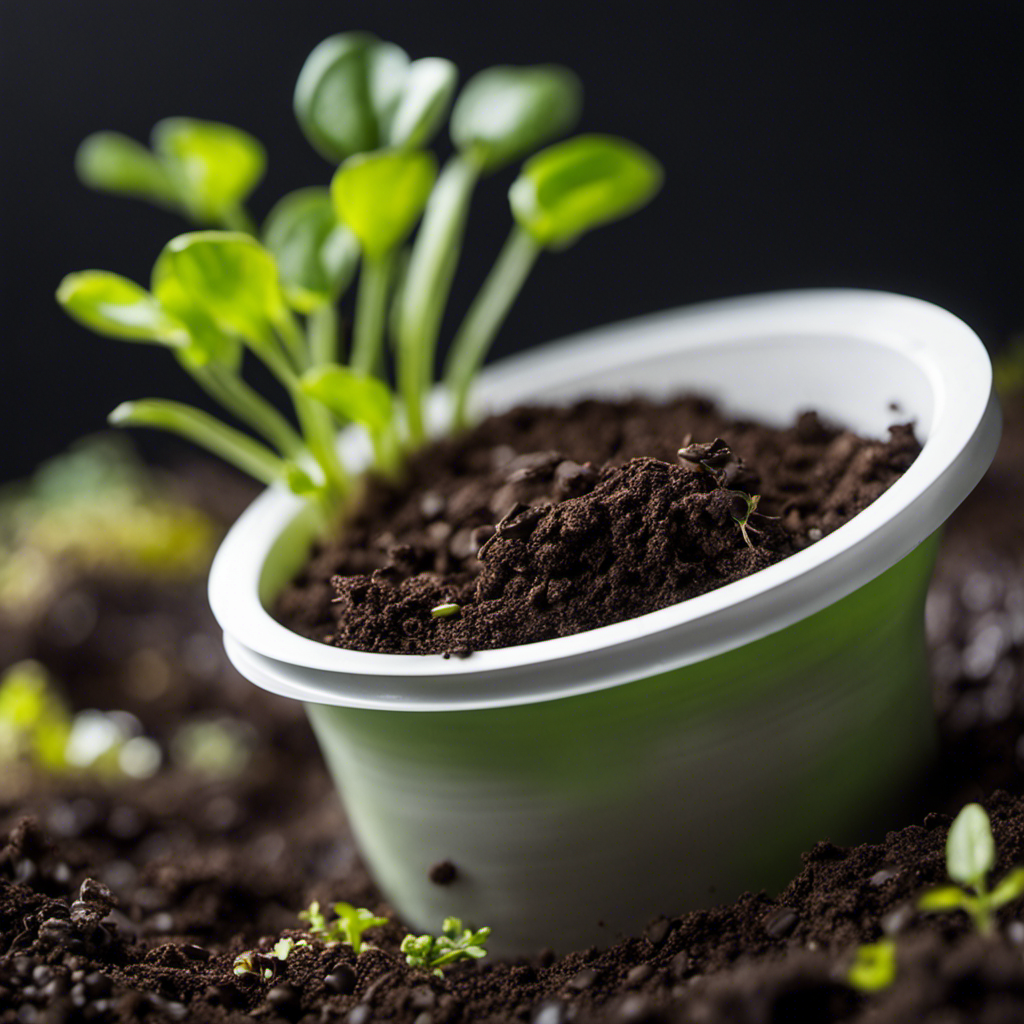
Bokashi: Fermenting Waste for Nutrient-Rich Soil
To achieve nutrient-rich soil, a crucial step in effective organic composting is using the technique of Bokashi, which involves fermenting waste. Bokashi fermentation is a simple and efficient way to compost kitchen waste and transform it into a valuable resource for your garden. This method is perfect for individuals who want to reduce their carbon footprint and minimize food waste.
During the bokashi fermentation process, you can place kitchen waste such as fruit and vegetable scraps, coffee grounds, and even meat and dairy products in an airtight container. Then, add a special mixture of beneficial microorganisms, typically in the form of bran or sawdust, to the waste. These microorganisms break down the organic matter through fermentation, resulting in a nutrient-rich liquid called bokashi tea and a solid material known as bokashi compost.
Using bokashi compost is as easy as burying it in your garden or mixing it with soil in plant pots. The fermentation process offers several benefits, including the ability to break down food waste that would otherwise emit strong odors or attract pests. Additionally, bokashi compost is packed with essential nutrients, making it an excellent fertilizer for your plants.
Here is a table summarizing the key steps of bokashi fermentation and its benefits:
| Steps of Bokashi Fermentation | Benefits |
|---|---|
| Place kitchen waste in an airtight container | Reduces odors and pest attraction |
| Add beneficial microorganisms to the waste | Efficiently breaks down organic matter |
| Ferment for 2-4 weeks | Produces nutrient-rich bokashi compost |
| Bury or mix bokashi compost in garden or pots | Provides plants with essential nutrients |
Bokashi fermentation is a fantastic method for composting kitchen waste and creating nutrient-rich soil for your plants. By utilizing this technique, we can contribute to a more sustainable and environmentally friendly approach to gardening.
Hot Composting: Speeding Up the Decomposition Process
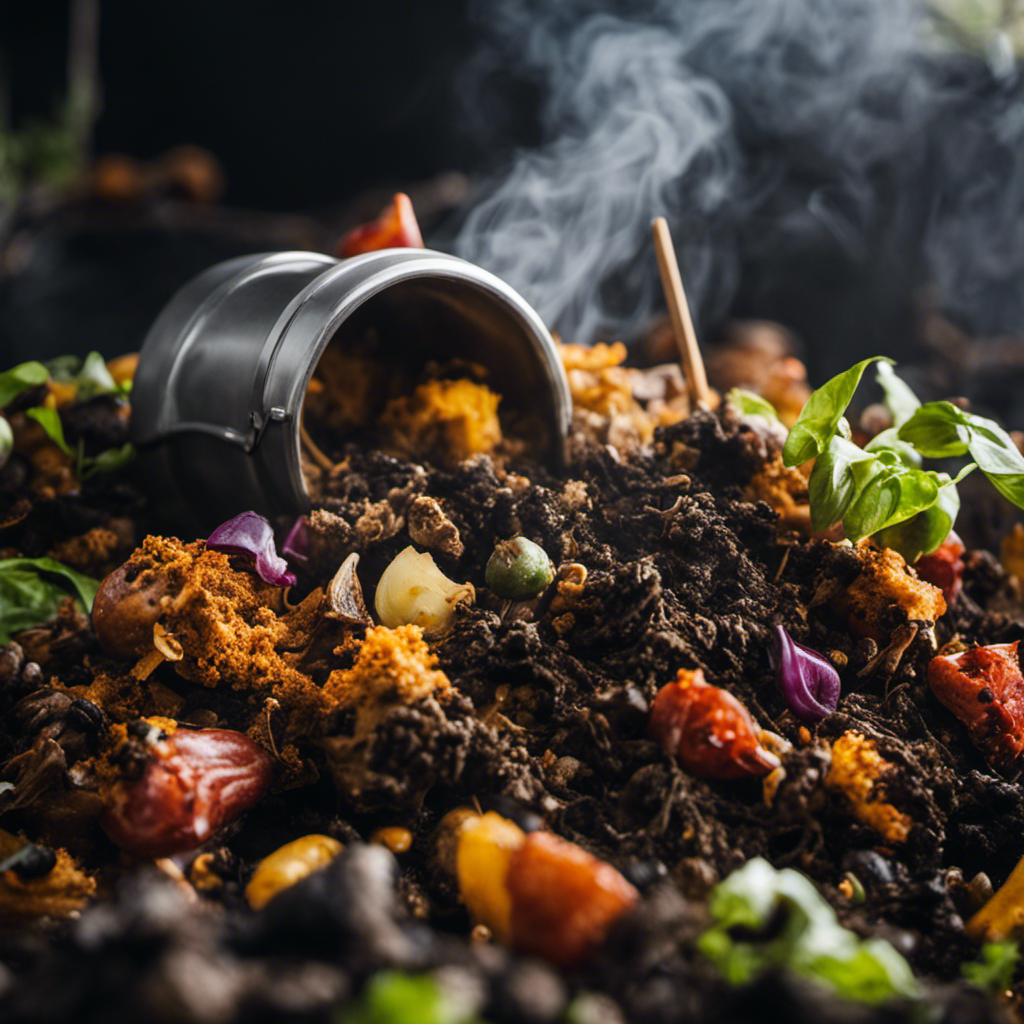
Effective organic composting involves using the technique of hot composting to speed up the decomposition process. Hot composting requires maintaining higher temperatures in the compost pile, which helps break down organic materials more efficiently.
Here are some tips to control the temperature for optimal composting:
-
Layering: Begin by creating a base layer of coarse materials like twigs or straw. Alternate layers of green (nitrogen-rich) and brown (carbon-rich) materials to promote airflow and distribute heat throughout the pile.
-
Moisture Management: Keep the compost pile moist, but not soaked. Aim for a moisture content of around 50-60%. You can use a moisture meter or simply squeeze a handful of compost – it should feel like a damp sponge. Water the pile as needed to maintain this moisture level.
-
Aeration: Regularly turn the compost pile to introduce oxygen and facilitate the decomposition process. You can use a pitchfork or compost turning tool to do this. Turning the pile every few days helps maintain heat and accelerates decomposition.
-
Insulation: Consider insulating the compost pile with materials like straw, leaves, or a compost cover. This helps retain heat and higher temperatures, especially during colder months.
By following these techniques, you can speed up the decomposition process and produce nutrient-rich compost for your gardening needs.
Happy composting!
Compost Tea: Supercharging Your Soil With Liquid Gold
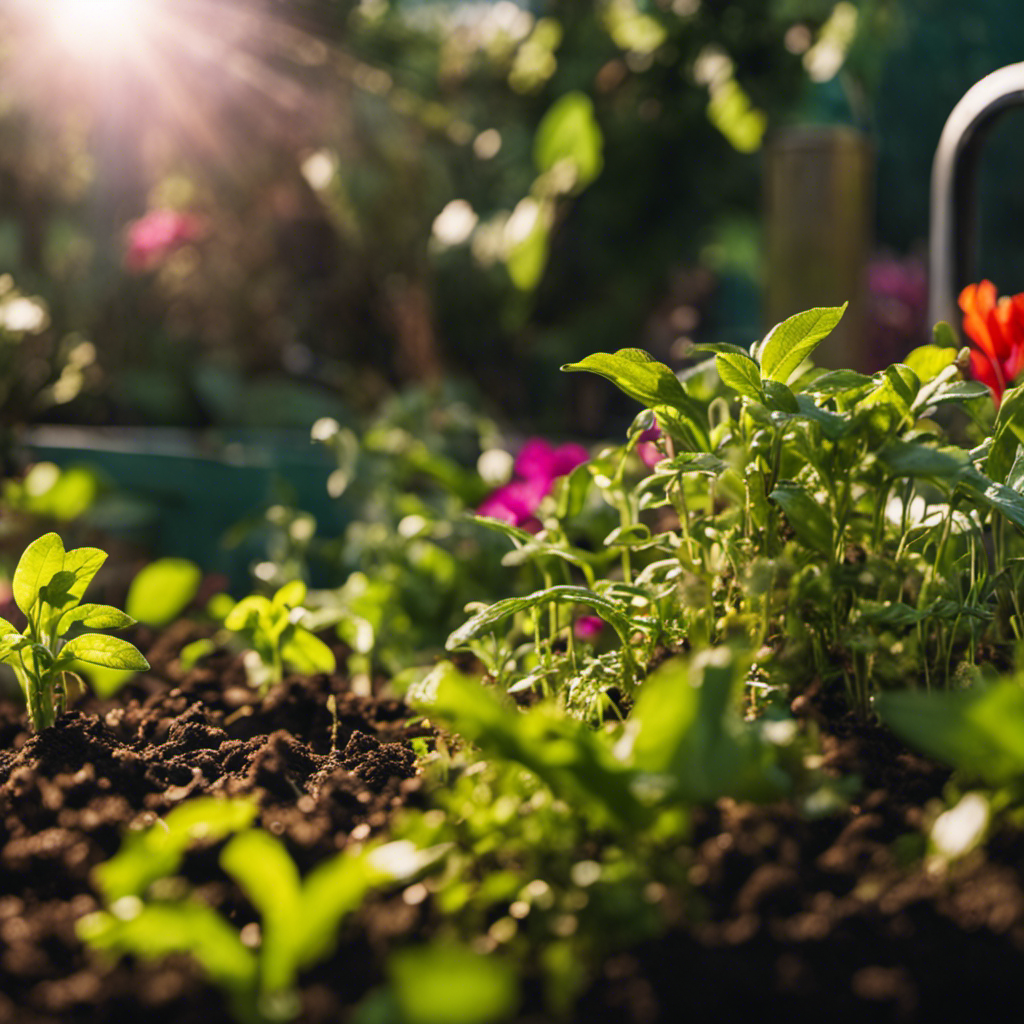
Compost tea is a valuable tool for organic gardeners looking to improve the fertility and health of their soil. It is simply a liquid fertilizer made by steeping compost in water, allowing the beneficial microorganisms and nutrients to be extracted. This nutrient-rich liquid can then be used to water plants, providing them with a boost of nutrients and beneficial bacteria.
There are several benefits of using compost tea for plant growth. First and foremost, it increases the availability of nutrients in the soil, making them easier for plants to absorb. This leads to healthier and more vigorous growth, as well as increased resistance to pests and diseases. Additionally, compost tea helps improve soil structure by increasing its water-holding capacity and reducing erosion. It also promotes the growth of beneficial microorganisms in the soil, such as mycorrhizal fungi, which form symbiotic relationships with plant roots and enhance nutrient absorption.
The process of making compost tea is fascinating. When compost is steeped in water, the microorganisms present in the compost multiply and release enzymes and other compounds that break down organic matter. These compounds, along with the nutrients in the compost, dissolve into the water, creating a nutrient-rich solution. The steeping process can take anywhere from a few hours to a few days, depending on the desired strength of the tea.
To illustrate the benefits of compost tea, here is a table highlighting some of its advantages for plant growth:
| Benefits of Compost Tea for Plant Growth |
|---|
| Increases nutrient availability |
| Improves soil structure |
| Enhances plant growth |
| Boosts resistance to pests and diseases |
| Encourages beneficial microorganisms |
Conclusion
Organic composting is a process that transforms waste into nutrient-rich soil, similar to a conductor orchestrating a symphony.
There are several methods you can use to achieve this harmonious garden transformation. One technique is vermicomposting, which involves harnessing the power of worms.
Another method is bokashi, where waste is fermented to speed up decomposition.
Additionally, hot composting can be employed to accelerate the process further.
To optimize plant growth, you can supercharge your soil with compost tea, a liquid gold for your garden.
By starting composting today, you’ll witness your garden flourishing like a beautiful melody.
